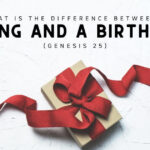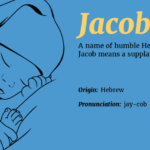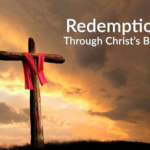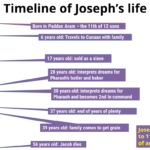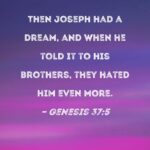In the Bible, Esau is a complex figure whose story is filled with themes of impulsivity, forgiveness, and redemption. **Genesis 25:27-34** tells of Esau selling his birthright to his brother Jacob for a bowl of stew, showing his impulsive nature. However, **Genesis 33:4** captures the moment when Esau forgives Jacob for deceiving him, highlighting themes of reconciliation and gratitude in Esau’s transformation.
Esau’s story serves as a reflection of human frailties and the power of family dynamics. **Hebrews 12:16-17** references Esau as an example of someone who sold his birthright for a single meal, emphasizing the consequences of making hasty decisions. Despite his faults, **Genesis 33:9** showcases Esau’s willingness to reconcile with Jacob, demonstrating the importance of forgiveness and second chances in relationships. The legacy of Esau continues to resonate with readers as they delve into themes of identity, choices, and the potential for redemption in the face of past mistakes.
– The Biblical Character of Esau: A Complex Portrait of Impulsivity and Redemption
The Biblical character of Esau is a complex portrait of impulsivity and redemption. Throughout the Bible, we see Esau exhibiting impulsive behavior, yet we also witness moments of redemption and growth in his character. Let’s explore the story of Esau and how he navigated these dynamics.
### Impulsivity of Esau:
1. **Trading Birthright for Lentil Stew**: In Genesis 25:29-34, Esau comes in from hunting, hungry and tired. He sells his birthright to his brother Jacob in exchange for a bowl of lentil stew, showing his impulsivity and lack of foresight.
2. **Marriage Choices**: Esau’s choice of wives in Genesis 26:34-35 displeased his parents Isaac and Rebekah. He married women from the Canaanite tribes, which was against his parents’ wishes and outside of God’s plan.
### Redemption of Esau:
1. **Reconciliation with Jacob**: Despite his initial anger towards Jacob for tricking him out of his blessing, Esau eventually forgives his brother and they reconcile. In Genesis 33:4, Esau runs to meet Jacob, embraces him, and they weep together.
2. **Generosity towards Jacob**: In Genesis 33:9, Esau refuses Jacob’s gifts, stating that he has plenty and does not need them. This act of generosity shows a transformation in Esau’s character towards forgiveness and humility.
### Bible Verses:
#### Impulsivity:
##### Genesis 25:32-33:
“Look, I am about to die,” Esau said. “What good is the birthright to me?” But Jacob said, “Swear to me first.” So he swore an oath to him, selling his birthright to Jacob.
##### Genesis 26:34-35:
“…Esau married Judith daughter of Beeri the Hittite, and also Basemath daughter of Elon the Hittite. They were a source of grief to Isaac and Rebekah…”
#### Redemption:
##### Genesis 33:4:
“But Esau ran to meet Jacob and embraced him; he threw his arms around his neck and kissed him. And they wept.”
##### Genesis 33:9:
“But Esau said, ‘I already have plenty, my brother. Keep what you have for yourself.'”
In conclusion, the Biblical character of Esau presents a complex narrative of impulsivity and redemption. Despite his initial impulsive actions, we see Esau grow and evolve through moments of forgiveness, reconciliation, and generosity. Esau’s story reminds us that redemption is possible for all, regardless of our past mistakes.
– Understanding the Transformation of Esau: Lessons on Forgiveness and Gratitude
Esau, the brother of Jacob, is often remembered for his impulsive decision to trade his birthright for a bowl of stew. This act of impulsivity and lack of foresight led to resentment towards his brother Jacob, which eventually escalated into a deep-rooted animosity. However, as we delve into the transformation of Esau, we find valuable lessons on forgiveness and gratitude that are still relevant today.
Forgiveness: Letting go of bitterness
– “Be kind to one another, tenderhearted, forgiving one another, as God in Christ forgave you.” – Ephesians 4:32.
– “And whenever you stand praying, forgive, if you have anything against anyone, so that your Father also who is in heaven may forgive you your trespasses.” – Mark 11:25.
Esau’s initial reaction to Jacob’s deception was one of anger and bitterness. However, as time passed, Esau underwent a transformation that led him to forgive his brother. In Genesis 33:4, we see Esau running towards Jacob, embracing him, and showing forgiveness. This act of forgiveness not only healed the rift between the brothers but also paved the way for reconciliation and peace.
Gratitude: Counting your blessings
– “Give thanks in all circumstances; for this is the will of God in Christ Jesus for you.” – 1 Thessalonians 5:18.
– “Bless the Lord, O my soul, and forget not all his benefits.” – Psalm 103:2.
As Esau reflected on the events that transpired between him and Jacob, he came to a place of gratitude. In Genesis 33:9, Esau expresses his gratitude towards Jacob, saying, “I have enough, my brother; keep what you have for yourself.” This acknowledgment of having enough and being content with what he had is a powerful lesson in gratitude.
Lessons learned from Esau’s transformation
1. Forgiveness is a choice that leads to healing and reconciliation.
2. Gratitude allows us to recognize and appreciate the blessings in our lives.
3. Holding onto bitterness only harms ourselves, while forgiveness sets us free.
4. Gratitude shifts our focus from what we lack to what we have, fostering contentment.
5. Transformation is possible when we choose forgiveness and gratitude over resentment and bitterness.
Through the story of Esau, we are reminded of the transformative power of forgiveness and gratitude. As we navigate our own relationships and struggles, may we learn from Esau’s journey and choose the path of forgiveness and gratitude, leading to healing, reconciliation, and a heart filled with peace.
– Esau’s Story as a Reflection of Human Frailties and the Power of Family Dynamics
The story of Esau from the Bible is a poignant reflection of human frailties and the power of family dynamics. Esau and his twin brother Jacob had a tumultuous relationship from birth, which eventually led to a series of events that highlighted the complexities of human nature and family relationships.
1. **Esau’s Impulsiveness:** Esau, as the older of the twins, had the birthright, a significant blessing in their culture. However, in a moment of weakness and impulsiveness, he traded it for a bowl of lentil stew when he was hungry. This impulsive decision cost him his birthright, showing how easily human frailties such as hunger and immediate gratification can lead to destructive consequences.
2. **Jacob’s Deception:** On the other hand, Jacob, known for his cunning nature, took advantage of Esau’s impulsiveness and deceived their father, Isaac, to receive the blessing meant for the firstborn son. This deception further strained the already fragile relationship between the brothers, showcasing the destructive power of envy and deceit within families.
3. **Esau’s Forgiveness:** Despite the betrayal and deception, Esau eventually showed immense grace and forgiveness towards Jacob. When the brothers finally reunited after years of separation, Esau embraced Jacob with open arms, demonstrating the healing power of forgiveness and reconciliation within families.
4. **Family Unity:** Through the story of Esau and Jacob, we see the complexity of family dynamics and the impact of jealousy, betrayal, forgiveness, and reconciliation on relationships. The story serves as a reminder of the importance of love, forgiveness, and unity in overcoming the challenges that families face.
5. **God’s Plan:** Throughout the story of Esau and Jacob, we see God’s sovereign plan at work, despite the human frailties and shortcomings of the characters. Despite their flaws, God’s redemptive plan was still fulfilled through the lineage of Jacob, showing that even in the midst of human weakness, God’s purposes prevail.
Bible Verses:
1. **Genesis 25:29-34 (ESV):**
“Once when Jacob was cooking stew, Esau came in from the field, and he was exhausted. And Esau said to Jacob, ‘Let me eat some of that red stew, for I am exhausted!’… Jacob said, ‘Sell me your birthright now.’ Esau said, ‘I am about to die; of what use is a birthright to me?'”
2. **Genesis 27:35-36 (ESV):**
“But he said, ‘Your brother came deceitfully, and he has taken away your blessing.’ Esau said, ‘Is he not rightly named Jacob? For he has cheated me these two times. He took away my birthright, and behold, now he has taken away my blessing.'”
3. **Genesis 33:4 (ESV):**
“But Esau ran to meet him and embraced him and fell on his neck and kissed him, and they wept.”
4. **Proverbs 17:17 (ESV):**
“A friend loves at all times, and a brother is born for adversity.”
5. **Colossians 3:13 (ESV):**
“Bear with each other and forgive one another if any of you has a grievance against someone. Forgive as the Lord forgave you.”
In conclusion, the story of Esau and Jacob serves as a powerful testimony of the complexities of human relationships, the frailties of human nature, and the transformative power of forgiveness and reconciliation within families. As we navigate our own family dynamics, may we learn from the lessons in this biblical narrative and strive towards love, forgiveness, and unity in our own relationships.
– The Legacy of Esau: Exploring Themes of Identity, Choices, and Second Chances
The Legacy of Esau: Exploring Themes of Identity, Choices, and Second Chances
In the Bible, the story of Esau and Jacob is one that explores themes of identity, choices, and second chances. Esau, the older twin of Jacob, is known for selling his birthright for a bowl of soup, a decision that haunted him for the rest of his life. His story serves as a cautionary tale about the consequences of our choices and the importance of understanding our true identity in Christ.
1. The Importance of Identity:
– Esau’s identity was linked to his birthright as the firstborn son, a position of privilege and responsibility. However, he forfeited this inheritance for immediate gratification, showing a lack of understanding of his true worth and purpose.
– “But you are a chosen people, a royal priesthood, a holy nation, God’s special possession, that you may declare the praises of him who called you out of darkness into his wonderful light.” – 1 Peter 2:9
2. The Power of Choices:
– Esau’s choice to exchange his birthright for a bowl of soup was impulsive and short-sighted, highlighting the temptation to prioritize temporary pleasures over long-term blessings.
– “So then, each of us will give an account of ourselves to God.” – Romans 14:12
3. Second Chances:
– Despite Esau’s initial mistake, he eventually reconciled with his brother Jacob, demonstrating the possibility of redemption and forgiveness even after making poor choices.
– “If we confess our sins, he is faithful and just and will forgive us our sins and purify us from all unrighteousness.” – 1 John 1:9
4. The Mercy of God:
– Through Esau’s story, we see God’s mercy and grace at work, offering second chances to those who repent and turn back to Him.
– “The Lord is compassionate and gracious, slow to anger, abounding in love.” – Psalm 103:8
5. The Process of Transformation:
– Esau’s journey from a impulsive decision maker to a reconciled brother reflects the transformative power of God’s love and forgiveness in our lives.
– “Therefore, if anyone is in Christ, the new creation has come: The old has gone, the new is here!” – 2 Corinthians 5:17
In conclusion, the legacy of Esau reminds us of the importance of understanding our true identity in Christ, making wise choices that align with God’s will, and embracing second chances through His mercy and grace. Let us learn from Esau’s story and strive to live a life that reflects God’s love and redemption.
In conclusion, Esau from the Bible is a complex and multifaceted character whose story serves as a reminder of the importance of forgiveness, redemption, and the consequences of our actions. Whether we see him as a cautionary tale or a symbol of humility and transformation, Esau’s journey reminds us of the power of choice and the ability to change our paths. As we reflect on his story, may we strive to learn from his mistakes and seek a greater understanding of ourselves and our relationships with others. Thank you for joining us on this exploration of Esau’s tale, may it inspire us to navigate our own journeys with grace and introspection.


